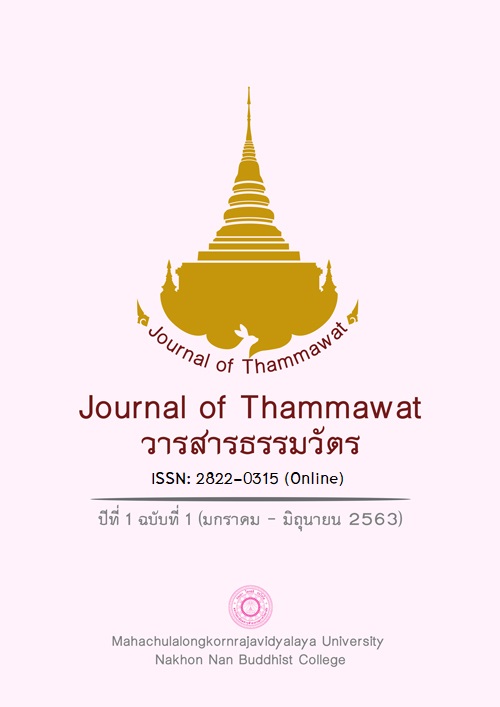A Comparative Study of the Happiness in Concept of Theravada Buddhism and Roman Catholic Christianity
Main Article Content
Abstract
Happiness in perspective of Buddhism means two kinds of happiness, 1) Kâyikasukkha:
bodily happiness, which is resulting from economic security, enjoyment of wealth,
account of freedom from debt, and account of leading a faultless life or bliss from the five
pleasures which is worldly happiness, and 2) Cetasika-sukkha: mental happiness, which is
classifying happiness which is resulting from Jhana: absorption and Samâpatti: attainments
which are Lokiya-sukkha: mundane happiness. It is greatest. The happiness resulted from
attains the enlightenment (Nibbâna) which is the exhaustion of mental intoxicants, because
Nibbâna is the greatest bliss which is Lokuttara-sukkha: Supramundane happiness. Happiness in perspective of Christianity means two kinds of happiness as Buddhism. But it is different from Buddhism that it is the part of happiness in this life and next life including the greatest happiness. Christianity thinks that human beings getting happiness have to have love and faith in God with deeply mind, wisdom and thought. When they have love and faith in God, they will be ready to follow the God’s order such Baptism. Then human beings will get salvation which is the salvation from sin and live together with God in the heavenly realms that is no birth, old, sick, and death, it only is mundane happiness, not the same as the ultimate goal (Nibbâna) which is the supramundane happiness.
Article Details

This work is licensed under a Creative Commons Attribution-NonCommercial-NoDerivatives 4.0 International License.
References
พระคำรณ เหว่ทู. (2551). การศึกษาวิเคราะห์เรื่องความสุขในพระพุทธศาสนาเถรวาทกับความสุขในสังคมไทยปัจจุบัน. (วิทยานิพนธ์พุทธศาสตรมหาบัณฑิต). มหาจุฬาลงกรณราชวิทยาลัย.
พระพรหมคุณาภรณ์ (ป.อ.ปยุตฺโต). (2549). สุขภาวะองค์รวมแนวพุทธ. พิมพ์ครั้งที่ 5. กรุงเทพฯ: ม.ป.พ.
พระมหาสมปอง มุทิโต. (2525). คัมภีร์อภิธานวรรณนา. กรุงเทพฯ: โรงพิมพ์ธรรมสภา.
พระสุริยัญ ชูช่วย. (2546). การแสวงหาความสุขและคุณค่าของชีวิต กรณีศึกษา ทัศนะกลุ่มคนต่างวัยในกรุงเทพมหานคร. (วิทยานิพนธ์ศิลปศาสตรมหาบัณฑิต). มหาวิทยาลัยมหิดล.
พุทธทาสภิกขุ. (ม.ป.ป.). คริสตธรรม พุทธธรรม. กรุงเทพฯ: ธรรมสภา.
พุทธทาสภิกขุ. (. (ม.ป.ป.). ปัญหาเกี่ยวกับพระผู้เป็นเจ้า กรรม อนัตตา. กรุงเทพฯ: เจริญรัฐการพิมพ์.
ราชบัณฑิตยสถาน. (2546). พจนานุกรมฉบับราชบัณฑิตยสถาน พ.ศ.2542. กรุงเทพฯ: นานมีบุ๊คส์พับลิเคชั่นส์.
มหาวิทยาลัยมหาจุฬาลงกรณราชวิทยาลัย. (2539). พระไตรปิฎกภาษาไทย ฉบับมหาจุฬาลงกรณราชวิทยาลัย. กรุงเทพฯ: โรงพิมพ์มหาจุฬาลงกรณราชวิทยาลัย.


